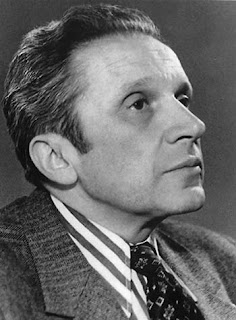Information
Composer: Mieczysław Weinberg
Mieczysław Weinberg, piano
Borodin QuartetRostislav Dubinsky, violin
Yaroslav Alexandrov, violin
Dmitri Shebalin, viola
Valentin Berlinsky, cello
Date: 1961 (6), 1963 (1-5)
Label: Melodiya
- (01) Piano Quintet in F minor, Op. 18
- (06) String Quartet No. 8 in C minor, Op. 66
Mieczysław Weinberg, piano
Borodin QuartetRostislav Dubinsky, violin
Yaroslav Alexandrov, violin
Dmitri Shebalin, viola
Valentin Berlinsky, cello
Date: 1961 (6), 1963 (1-5)
Label: Melodiya
----------------------------------------------------------------------------
Two classic performances, one with the composer’s imprimatur as executant. The wartime Piano Quintet is a fascinating work written in five movements that bears some similarity with Shostakovich’s Piano Trio. Completed in 1944 it was first performed by Gilels and the Quartet of the Bolshoi Theatre. The melancholy lyricism of the first movement fuses with jagged march themes which in turn become more and more garrulous and menacing. By the Allegretto increasing motor rhythms and oily lines for solo strings and heavy rhythmic attacks – strong independent piano part, powerful unison strings – bring hints of baroque procedure and a grave conclusion. It’s a quintet that really covers all emotive states, from the almost manic first violin of the Presto to the stern passacaglia-like fourth movement Largo. Here the long, and limpidly sung piano is flecked with great gravity, a memorable movement. To my ears the finale has a weird Scotch snap to it – a scotch reel fugato if one can imagine it in the context of a Weinberg quintet and there are also moments of almost hallucinatory boogie; I couldn’t quite believe it. The ghostly mists gradually descend though and we end with fugitive and ambiguous quiet. It’s an unsettling work, kaleidoscopic, deeply rooted in Shostakovich of course but still sounding intensely personal.
Coupled with it is the 1959 Eighth Quartet. Once more the tugs of meditative control and melancholy drift are powerful poles around which the emotive motor turns. But the urgent expressivity is contrasted in the lighter moments with folkloric dance and drive and a return to the newly mobile material, which is now laced with pizzicati. It maybe in sonata form but its one movement multi-partite fifteen-minute span is tremendously impressive as a cohesive statement. There is real variety - of mood, texture, rhythm, colour – and its performance here by its dedicatees, the Borodin Quartet - sounds well nigh definitive.
Melodiya’s presentation is attractive and there are multi-lingual notes. There’s some audible tape hiss at moments in the 1963 recording of the Quintet though the earlier 1961 Quartet fares better in this respect. In any case it’s a very minor question and won’t at all impede your listening. These are two big, powerful and comprehensively impressive musical statements.
-- Jonathan Woolf, MusicWeb International
Coupled with it is the 1959 Eighth Quartet. Once more the tugs of meditative control and melancholy drift are powerful poles around which the emotive motor turns. But the urgent expressivity is contrasted in the lighter moments with folkloric dance and drive and a return to the newly mobile material, which is now laced with pizzicati. It maybe in sonata form but its one movement multi-partite fifteen-minute span is tremendously impressive as a cohesive statement. There is real variety - of mood, texture, rhythm, colour – and its performance here by its dedicatees, the Borodin Quartet - sounds well nigh definitive.
Melodiya’s presentation is attractive and there are multi-lingual notes. There’s some audible tape hiss at moments in the 1963 recording of the Quintet though the earlier 1961 Quartet fares better in this respect. In any case it’s a very minor question and won’t at all impede your listening. These are two big, powerful and comprehensively impressive musical statements.
-- Jonathan Woolf, MusicWeb International
----------------------------------------------------------------------------
Mieczysław Weinberg (8 December 1919 in Warsaw – 26 February 1996 in Moscow) was a Soviet composer of Polish-Jewish origin. From 1939 he lived in the Soviet Union and Russia and lost most of his family in the Holocaust. He left a large body of work that included twenty-two symphonies and seventeen string quartets. Weinberg's works frequently have a strong programmatic element. Throughout his life, he continually referred back to his formative years in Warsaw and to the war. Although he never formally studied with Shostakovich, the older composer had an obvious influence on Weinberg's music.
https://en.wikipedia.org/wiki/Mieczys%C5%82aw_Weinberg
***
https://en.wikipedia.org/wiki/Mieczys%C5%82aw_Weinberg
***
Borodin Quartet is a string quartet that was founded in 1945 in the then Soviet Union. It is one of the world's longest lasting string quartets. The quartet was one of the Soviet Union's best known in the West during the Cold War era, through recordings as well as concert performances in the United States and Europe. The quartet had a close relationship with composer Dmitri Shostakovich, and also performed with the pianist Sviatoslav Richter on many occasions. Their recordings include works by a wide range of composers on the Melodiya, Teldec, Virgin Records, and Chandos Records labels.
----------------------------------------------------------------------------
FLAC, tracks
Links in comment
Enjoy!




This comment has been removed by the author.
ReplyDeleteBeautiful. Thanks, as always. (For what it's worth, love the cover art of the two postings of recordings by Kremerata Baltica with Gidon Kramer -- both the blurry Moscow street scene and the snowy Red Square.) Think I shall now download the newly posted Weinberg cello sonatas. Nobody milks a cello the way the Russians do.
ReplyDeleteThis comment has been removed by the author.
ReplyDeleteDear Ronald Do: Can you re-upload this post? Thank you very much.
ReplyDeleteChoose one link, copy and paste it to your browser's address bar, wait a few seconds (you may need to click 'Continue' first), then click 'Skip Ad' (or 'Get link').
ReplyDeleteIf you are asked to download or install anything, IGNORE, only download from file hosting site (mega.nz).
If MEGA shows 'Bandwidth Limit Exceeded' message, try to create a free account.
http://pecurgoa.com/13Vf
or
https://uii.io/0GVjq2
or
https://exe.io/ENwpx
Thank you!
ReplyDeleteAlso I want to thank for many albums of wonderful music shared in your other blog, musique classique, as only members can send comments in that site.